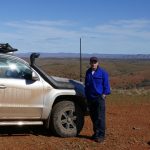- The Australian MS Longitudinal Study has been critical to understanding the needs of people with MS in Australia.
- The latest studies have provided diverse data, including the importance of MS Nurses, exercise for people with MS living remotely, the effect of MS medications on COVID-19 severity and the psychosocial impacts of MS in the workplace.
- We are seeking new participants, especially for our current and upcoming studies on self-concept in MS and the health economic impacts of this chronic disease.
MS is a chronic disease that can impact life in many and sometimes unexpected ways. To provide the best holistic support for people living with MS, their families and carers, we need real-life data about this impact.
The Australian MS Longitudinal Study (AMSLS) is an ongoing survey-based study funded by MS Australia that has been running for 20 years.
Each year, around 2500 people with MS in Australia tell us about how they are living with MS and what they need to help live with it better.
The topics are diverse, from poor sleep in MS and the benefits of MS Nurse care to associations of particular MS medications with COVID-19 severity and self-reported health and employment outcomes.
Here’s an update of some of the team’s latest findings, and opportunities coming soon to share the MS lived experience.
How does MS impact productivity at work?
Past AMSLS studies have shown that the severity of MS symptoms impacts people’s work productivity. While these findings are a “no-brainer” for a person living with MS, formal data like this helps immeasurably with our advocacy for greater government support.
But a new study has shown there can be other more subtle psychological and social factors at play too. The researchers found that self-confidence, self-efficacy and interpersonal difficulties at work can also have a significant impact on work productivity for people with MS.
They suggest that support teams need to assist people living with MS who are having difficulties with work productivity not only with self-care of MS symptoms, but with skills around effective communication about their MS in the workplace, the psychological impact of work and the modification of work demands.
How can we best support exercise programs for people with MS in Australia?
Historically, there were concerns about exercise for people with MS, especially because of MS fatigue and difficulties with heat tolerance. Additionally, during the COVID-19 pandemic, participation in physical activity reduced in people with MS.
However, Dr Yvonne Learmonth, a physiotherapist with a special research interest in exercise training in MS, says exercise is beneficial for people with MS as it can protect nerve cells against damage.
“There are a growing number of studies indicating the neuroprotective role exercise plays in MS. In MS, exercise can decrease neurodegeneration, and have a positive effect at stimulating neuroplasticity whereby the neural system can modify its activity for positive outcomes, ” Dr Learmonth said.
In her latest study, Dr Learmonth asked the AMSLS for help in understanding whether exercise programs need to be tailored differently for in Australia who are living in rural and remote communities.
She found that 24% of people living with MS did not engage in physical activity and, surprisingly, remote living made no difference to this proportion. In fact, people living remotely who did engage in physical activity had higher levels of physical activity.
This information will be invaluable for ensuring that exercise training programs are appropriate for people with MS in regional, rural and remote Australia.
Does MS impact how you see yourself?
Self-concept refers to how you see and feel about yourself and, therefore, how you relate to others and what you believe you are capable of. It is one of the most important things about being human and is related to almost everything we do and the decisions we make.
It is important for clinicians and researchers to understand not just the symptomatic changes of MS, but also the internal and personal changes that people experience.
Our current AMSLS survey asks about self-concept and whether it has changed since an MS diagnosis. Understanding how MS may impact self-concept gives us an idea of how much MS impacts quality of life. This understanding is central to developing and improving existing psychological supports for the wellbeing of people living with MS.
How prevalent is MS in Australia, and what is the economic cost?
In 2016, the AMSLS assessed how many people in Australia have MS and investigated its economic cost, from care and medication costs through to lost wages.
For the 25,600 people living with MS in Australia, the societal cost for someone with no disability was around $31,000 compared to a cost of $115,000 for someone living with a severe disability.
This report and findings have been invaluable for our advocacy activities for the subsidy of new MS medications, better NDIS access and funding for life-changing MS research.
We will update this study in two stages over 2022-2023 and are seeking new participants to help accurately reflect today’s Australian MS community.
Are you interested in helping or finding out more?
Through the generosity of our study participants, we are learning more about how to best support people with MS in Australia. Here’s one of our participants talking about why she loves being involved.
You can follow the links to find out more or become a participant, or talk to the AMSLS team at the Menzies Institute for Medical Research directly on AMSLS.info@utas.edu.au.
https://www.youtube.com/watch?time_continue=7&v=dByYdc6SA4g&feature=emb_logo




